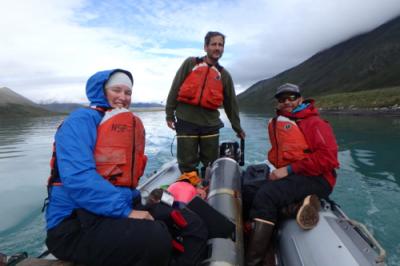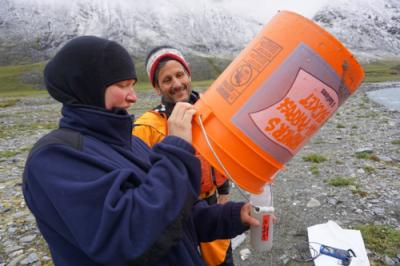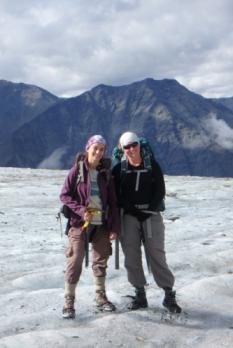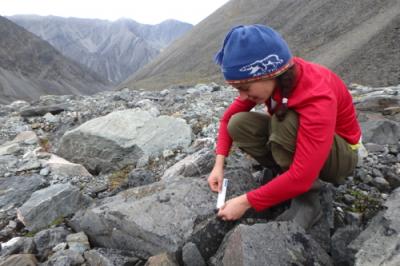The Expedition
In August 2017, I spent two weeks at Lake Peters, in the Arctic National Wildlife Refuge. My team included Darrell Kaufman, project co-PI and Professor in the School of Earth Sciences & Environmental Sustainability, Ellie Broadman, graduate student and PolarTREC researcher, and graduate student Chris Benson, all of Northern Arizona University. Our research was part of the final year of the Arctic Glacial Lakes project, a three year research project spanning three lakes and involving many scientists and graduate students across several universities. The research at Lake Peters uses lake sediments and current hydrology and glacier data to construct models that will attempt to predict past climate and future changes to glacial systems. Our diverse fieldwork included collecting sediment traps from Lake Peters and Lake Schrader, measuring flow and sediment load of Lake Peters inlets, hiking up moraines and on Chamberlin Glacier to download data and pack out equipment, collecting water samples for isotope analysis, and measuring lichens to date moraines.

Upon completion of our fieldwork, Ellie and I continued traveling through Alaska. We visited Kaktovik, an Inupiat village near Lake Peters, to talk to 3rd-12th grade students about our research and make connections with the principal and science teacher at the school. In Kaktovik, we reached out to community members informally, and made connections with scientists involved in the Oceanography Summer Program and the new LTER based in Kaktovik, as well as land managers of ANWR. We also visited Anchorage, where we met project collaborator Johnse Ostman and visited Lake Eklutna, another Arctic Glacial Lakes site. This deepened my understanding of the scope of project, and allowed Ellie and I to further our collaborative relationship.
Developing as a Scientist

Value of Teacher/Researcher Relationships

Impact on My Students
Before I departed, I underestimated the value of my expedition for my students. In the internet age, photos and data sets from almost any location are available in an instant, so I did not need to visit the Arctic to share it with my students. At times, I wondered what my students could actually gain from my participation, aside from my own growth as a scientist and communicator. But upon returning to school, it was obvious that their personal relationship with me allowed them to enjoy my experience vicarious, which brought an incredible level of excitement and engagement into my classroom. A picture of a glacier, or a porcupine, or even a tundra plant, means so much more when I am the one that took it, and they love hearing my stories and asking about the places I have been able to visit. I feel a renewed excitement as well, which is always beneficial for a teacher. In addition, my students have followed along with the struggles and joys of my expedition. Their reports that they were inspired by my journey makes me feel confident that I achieved my goal of modeling perseverance through difficulty for my students. Finally, my expedition has given my students connections. Now they, too, have a personal relationship with my scientific team. Having Ellie and Darrell visit last year, and plan to return this year, has been powerful. Ellie is a celebrity in my classroom, and connecting ideas to her research instantly makes topics relevant, simply because of their personal connection to her. I also plan to develop my connection to Kaktovik and have begun initial plans with the science teacher for collaborations. My students immediately felt a connection to the rural Kaktovik students, and I hope to build these relationships over time.
Beyond the Classroom
While the vast majority of the impact from my expedition has been for me and my students, it has expanded beyond my classroom as well. Before the end of the last school year, I had each student make a postcard, which I sent back to them from Alaska. 
My Future
As I move forward in life and my career, I plan to used my PolarTREC experience as a springboard to achieve some of my more ambitious goals. I hope to become more involved in experiential education, possibly developing a program at my school, and now that I have more connections and resources, this goal feels much less daunting. Networking with other teachers and scientists is less intimidating, and instead of avoiding opportunities to develop professional relationships, I now am more capable of engaging in them on my own. As a result, I know my professional network will expand to include more scientists. I see more clearly the benefit of concrete experiences in my classroom, such as visiting scientists, research experience, and expeditions, and by seeking collaborative relationships with scientists, I will increase these opportunities for my students. Before PolarTREC, I had many vague ideas about what I would like to do with my career. Now, I have a much clearer path, I know what specific ideas of actions I need to take, and I have many people, both teachers and scientists that will help me achieve my goals.

| Attachment | Size |
|---|---|
| Download Report (967.87 KB)967.87 KB | 967.87 KB |
This program is supported by the National Science Foundation. Any opinions, findings, and conclusions or recommendations expressed by this program are those of the PIs and coordinating team, and do not necessarily reflect the views of the National Science Foundation.
